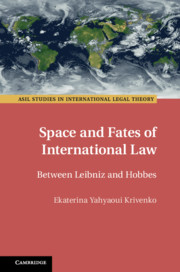Book contents
- Space and Fates of International Law
- ASIL Studies in International Legal Theory
- Space and Fates of International Law
- Copyright page
- Dedication
- Contents
- Note on Uses of Leibniz’s and Hobbes’s Works and Abbreviations
- Introduction
- 1 Science and Law in the Seventeenth Century
- 2 Space
- 3 The Idea of Universals and Human Cognition
- 4 Law
- 5 Intermezzo
- 6 Space(s) of International Law
- Conclusions and the Way Forward
- Bibliography
- Index
2 - Space
Published online by Cambridge University Press: 20 August 2020
- Space and Fates of International Law
- ASIL Studies in International Legal Theory
- Space and Fates of International Law
- Copyright page
- Dedication
- Contents
- Note on Uses of Leibniz’s and Hobbes’s Works and Abbreviations
- Introduction
- 1 Science and Law in the Seventeenth Century
- 2 Space
- 3 The Idea of Universals and Human Cognition
- 4 Law
- 5 Intermezzo
- 6 Space(s) of International Law
- Conclusions and the Way Forward
- Bibliography
- Index
Summary
The chapter presents concepts of space as developed by Hobbes and Leibniz respectively. It highlights commonalities and differences in their respective concepts of space. For Hobbes, the concept of space is articulated through ideas of imaginary and real space. Hobbesian space emerges as determined by the measurment of bodies, material and thus controllable. This view of space strongly resonates with the uses of space is contemporary spatial justice studies. For Leibniz, space is a logical grounding against which the materiality of the world unfolds but also the outcome of the activity of monads as simple substances. For Leibniz, space as an order of relationships is not controllable but knowable.
Information
- Type
- Chapter
- Information
- Space and Fates of International LawBetween Leibniz and Hobbes, pp. 26 - 56Publisher: Cambridge University PressPrint publication year: 2020
